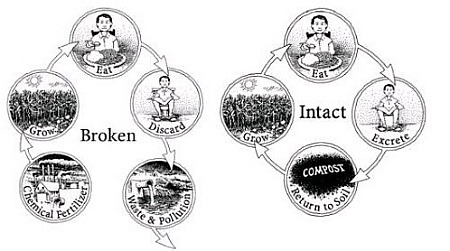The Humanure Handbook
By Joseph Jenkins
The Humanure Handbook by Joseph Jenkins was first born as a Masters Thesis for his Master of Science degree in Sustainable Systems. He translated his thesis into ordinary English for people like us. Despite its academic origins the result is both fascinating and entertaining. The bonus is that it is well researched, complete with footnotes and references. This is a good thing given it is dealing with that very scary subject - human poop.
The Circle of Life is Broken
It is Jenkins belief that the system we use for the everyday event of going to the toilet is broken. Consider this...
"We defecate into water, usually purified drinking water. After polluting our water with our excrement, we flush the polluted water "away", meaning we probably don't know where it goes, nor do we care."
Joseph Jenkins
Given the fact that many if not most people in the world have limited access to clean fresh water for drinking, is it not a travesty that we use it to ferry away our wastes?
The Humanure Handbook understands that the average person is not terribly eager to deal directly with their own excrement. We love flushing it away. We rarely take the time to add up the costs of this sewage system. However...
"... Flush toilets are disposal devices that create pollution and squander soil fertility. Composting toilets are recycling devices that should create no pollution and should recover the soil nutrients in the human manure and urine."
Joseph Jenkins
The book not only gives excellent information on composting toilets but also on composting in general. I am especially fond of the numerous excellent illustrations. Here is one that illustrates how most of our toilet systems function vs. the function of a composting toilet.

Where are the Toilets when Disaster Strikes?
This review is inspired by the fact that about 550,000 people in Japan have been displaced from their homes and naturally their toilets. And in Haiti, a year after its devastating earthquake close to two million people are still living in makeshift camps so simple, safe, sanitation is critical.
The Humanure Handbook is available in full for free online. It may seem odd to give away this priceless information but if you think about it, those most in need of a cheap and safe toilet solution may not be in a position to buy a book.
In fact Jenkins and a team of volunteers traveled to Haiti to help set up the simple safe sanitation system Jenkins has used in his own home for over 30 years. Here is a video showing how Jenkins and team pulled together the needed materials and introduced the super simple compost toilet system to one of the makeshift camps in Haiti.
If you are interested in more info there are additional videos on the training they did on building and managing the compost piles where the buckets of sawdust and human manure and urine are composted.
A Low Tech Practical Toilet
Jenkins Humanure Handbook proposes a very low tech, and very cheap solution to the toilet problem. It requires little more than several 20 liter or 5 gallon buckets and a high carbon covering material such as sawdust or peat. The toilets are compact and odor and fly free provided the material deposited is routinely covered with sawdust. In fact in Haiti people are able to locate their toilets right inside their tents.
Full buckets are transferred to a well constructed compost pile where the material is processed at high temperatures. Once the pile is completed no additional material is added. The pile is allowed to sit and finish. In a tropical country such as Haiti the compost should be ready to use safely on food crops in 4-6 months. In less tropical climes people should allow a finished pile to sit for a year before use.
The resulting compost, rather than being a disease vector and source of pollution the resulting compost will rebuild the soil and help feed the people.
Read the Humanure Handbook
The book is both a great read and a great resource. Of the 85 reviews at Amazon 76 gave it 5 stars and 5 more gave it 4. It will change the way you view your poop guaranteed. You might even find yourself thinking about giving up the flush and trying it yourself.
You can read the whole book on-line for free if you want. If you want to support Joe Jenkins work buy a digital copy for $10. Other options include an autographed copy for $25, or a copy bundled with a compost thermometer. Or you can get a discounted copy at amazon.com. Here is a link to amazon for the handbook and a few other related books.


